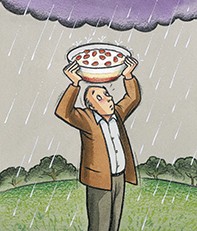Innocence revisited – 21
Dr Wijesinha describes some idiosyncrasies of the English language.
A rose by any other name
Having worked as a doctor in various parts of the English speaking world, I never cease to be amazed at the funny words we use to camouflage our embarrassment when we have to talk about natural bodily functions. Take the term ‘faeces’ for example.
Years ago when working in Africa I had difficulty getting a mother to understand that I needed to have a sample of her baby’s faeces for microscopy and culture. After trying all the words that I could think of (including stool, poo, doodoo, kakka, motions, etc.), I was about to give up when a burly Ugandan nurse threw me a pitying look, turned to the mother and commanded: ‘Doctor wants you to bring some of baby’s dung in a bottle tomorrow’.
The mother gave a smile of recognition, picked her baby up and walked away. She reappeared the next morning with a jam jar neatly wrapped in brown paper containing the sample that I needed.
When a spade is a spade
Confusion and embarrassment can also arise from words phrases that mean something quite different in another country. For example, unless you have grown up in the UK, it is natural to assume that the phrase ‘to spend a penny’ means exactly that – expending one-hundredth part of a sterling pound to purchase something. Is it fair, then, to expect someone who has learnt English in one of Britain’s former colonies to know that in England ‘spending a penny’ is a task that men perform standing up and women accomplish sitting down in the toilet?
Here in Australia our patients thankfully refer to spades as spades. The other day a patient came to see me at the Melbourne practice where I work carrying a little plastic container containing the products of his micturition and said, with a perfectly straight face, ‘Doc, this is for my piss-test’.
On another occasion in Oxford, England, it took me a while to work out that the Englishman who said ‘I’m feeling a trifle under the weather’ was suffering the same symptoms as an Australian who confesses to ‘feeling crook’. And the dear old woman in country Victoria who once told me that her snuffly grandson had ‘caught the wog’ was not being offensive to foreigners – she was simply using the vernacular term for a nasty virus.
The power of pronunciation
Even pronouncing familiar words can be hazardous when you are far away from the country in which you learnt English. When I was an intern in Sri Lanka, a patient who came to our hospital in Colombo saying, ‘Doctor, I just came to hospital to die’ could only be pitied. Being terminally ill, he or she just wanted to lie down and give up the ghost in the comfort of a hospital bed.
Here in Australia, on the other hand, I have discovered that a patient who proclaims, ‘Doc, I came to hospital “to die”’ is merely announcing when he arrived – ‘to die’ being the local way of pronouncing ‘today’ (to distinguish it from ‘yesterdie’, ‘Sundie’, ‘Mondie’, etc.).
Preventing blunders
Perhaps the last word on the subject should be reserved for the Scottish poet Robert Burns, who once said:
‘O wad some Power the giftie gie us
To see oursels as ithers see us!
It wad frae mony a blunder free us…’
Burns R. To a Louse. On seeing one on a lady’s Bonnet, at church, 1786.
Come to think of it, perhaps Robert Burns wasn’t speaking English either! MT

